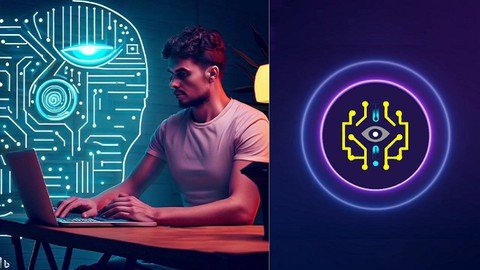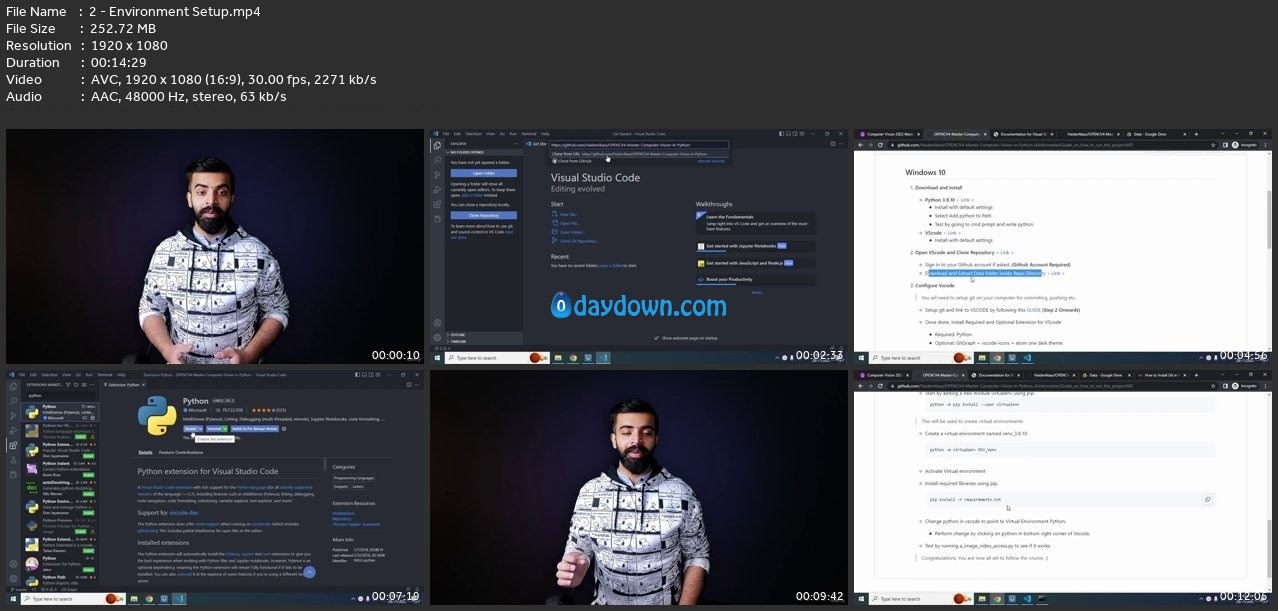
Last updated 5/2023
MP4 | Video: h264, 1920×1080 | Audio: AAC, 44.1 KHz
Language: English | Size: 12.83 GB | Duration: 12h 3m
Become a Computer Vision Guru, Implement object detection, tracking and recognition using OpenCV4, Dlib & Deep Learning
What you’ll learn
Become a Master Computer Vision Programmer by learning from the field experts.
Start from the ground up by Coding Image Processing basics i.e. (Image access and manipulations)
Make your CV Projects interactive by learning to utilize Trackbars and Mouse Events
Deep-dive into CV_101 topics i.e. (Transformations, Filtering, Segmentation, Contours and Features )
Conquer advanced techniques like Object detection, Object Tracking, Object Recognition
Understand, Train and deploy Haar Cascade and YOLOv3 for Object detection
Perform Single Object Tracking using CSRT, KCF etc. and Multi-Object Tracking using DeepSort.
Implement and compare Simple Face-Recognizers like LBP, FisherFaces with highly accurate dlib Implementation.
Secure Access: Create a python executable that only allows access on your pc to authorized personnel’s through a complete end-to-end development.
Requirements
Python basic Programming
Description
This course is your ultimate guide for entering into the realm of Computer Vision. We will start from the very basics i.e Image Formation and Characteristics, Perform basic image processing (Read/Write Image & Video + Image Manipulation), make CV applications interactive using Trackbars and Mouse events, build your skillset with Computer Vision techniques (Segmentation, Filtering & Features) before finally Mastering Advanced Computer Vision Topics i.e Object Detection, Tracking, and recognition. Right at the end, we will develop a complete end-to-end Visual Authorization System (Secure Access). The course is structured with below main headings.Computer Vision FundamentalsImage Processing Basics (Coding)CV-101 (Theory + Coding)Advanced [Detecion] (Theory + Coding)Advanced [Tracking] (Theory + Coding)Project: PeopleTrackr ( Crowd Monitoring System )Advanced [Recognition] (Theory + Coding)Project: EasyAttend ( Live Attendance System )Project: Secure Access (End-to-end project development & deployment)GoodbyeFrom Basics to Advanced, each topic will accompany a coding session along with theory. Programming assignments are also available for testing your knowledge. Python Object Oriented programming practices will be utilized for better development.Learning Outcomes – Computer VisionRead/Write Image & Video + Image ManipulationInteractive CV applications with Trackbars & MouseEventsLearn CV Techniques i.e (Transformation, Filtering, Segmentation, and Features)Understand, train, and deploy advanced topics i.e (Object Detection, Tracking, and Recognition) Test your knowledge by completing assignments with each topic. [Project-1] PeopleTrackr: Crowd Monitoring System [Project-2] EasyAttend: Live attendance System for Classrooms and offices.[Final-Project] Secure Access: End-to-end Visual Authorization System for your Computer.- AlgorithmsFacial recognition algorithms like LBP and Dlib-ImplementationLBP (Fast-Less accurate)Dlib-Implementation (Slow-Accurate)Single Object TrackersCSRT, KCFMultiple Object TrackersDeepSort (Slow-Accurate)Object DetectionHaar Cascades (Fast-Less accurate)YoloV3 (Slow-Accurate)Computer Vision TechniquesSift | Orb Feature MatchingCanny Edge detectionBinary, Otsu, and Adaptive ThresholdingKmeans SegmentationConvex hull ApproximationPre-Course RequirmentsSoftware BasedOpenCV4PythonSkill BasedBasic Python ProgrammingMotivated mind :)All the codes for reference are available on the GitHub repository of this course.Get a good idea by going through all of our free previews available and feel free to contact us in case of any confusion ?
Overview
Section 1: Prerequisites
Lecture 1 GitHub Resources And Dependencies
Lecture 2 Environment Setup
Section 2: Introduction
Lecture 3 Computer Vision Fundamentals
Section 3: Image Processing Basics
Lecture 4 Reading/Writing image and Videos in OpenCV (Coding)
Lecture 5 Image Manipulation (Coding)
Lecture 6 Important Functions (Coding)
Lecture 7 Make CV Applications Interactive #1 : Trackbars
Lecture 8 Make CV Applications Interactive #2 : MouseEvents
Section 4: CV-101
Lecture 9 Image Transformations (Theory)
Lecture 10 Image Transformations (Coding)
Lecture 11 Image Filtering (Theory)
Lecture 12 Image Filtering (Coding)
Lecture 13 Image Segmentation (Theory)
Lecture 14 Image Segmentation (Coding)
Lecture 15 Image Contours (Theory)
Lecture 16 Image Contours (Coding)
Lecture 17 Image Features – Keypoints (Theory)
Lecture 18 Image Features – Keypoints (Coding)
Lecture 19 Image Features – Descriptors (Theory)
Lecture 20 Image Features – Descriptors (Coding)
Lecture 21 Feature Matching
Section 5: Advanced ( Detection )
Lecture 22 Object detection (Theory)
Lecture 23 Haar Cascades (Theory) – Object Detection
Lecture 24 Training a Custom Haar Cascade detector (Coding) – Object detection
Lecture 25 Detection Using Haar Cascade (Coding) – Object Detection
Lecture 26 YOLO (Theory) – Object detection
Lecture 27 Detection Using YOLO in OpenCV (Coding) – Object detection
Lecture 28 Training YOLO on a Custom Dataset (Coding) – Object detection
Section 6: Advanced (Tracking)
Lecture 29 What is Object Tracking?
Lecture 30 Single Object Tracking (Theory) – Comparison
Lecture 31 Single Object Tracking (Coding)
Lecture 32 Multiple Object Tracking (T + C)
Lecture 33 MOT: DeepSort (Theory)
Lecture 34 MOT: DeepSort (Setup) – Environment Setup
Lecture 35 MOT: DeepSort (Theory) – Algorithm Overview
Lecture 36 MOT: DeepSort (Coding)
Section 7: Project 1: PeopleTrackr
Lecture 37 Feature 1: Live-People-Counter
Lecture 38 Feature 2: Displaying trajectories
Lecture 39 Feature 3: Focus On Suspicious Individual
Section 8: Advanced (Recognition)
Lecture 40 What is Image Recognition?
Lecture 41 Face Recognition OpenCV (Theory) – Comparison
Lecture 42 Face Recognition OpenCV (Coding)
Section 9: Project 2: Live Attendance System
Lecture 43 Part A: Workflow and Dataset Acquisition
Lecture 44 Part B: Implementation
Section 10: Final Project : Secure Access
Lecture 45 Part A: Face Detection
Lecture 46 Part B: Tracking
Lecture 47 Part C: Alignment & Representation
Lecture 48 Part D: Matching
Lecture 49 Part E: MultiProcessing
Section 11: Goodbye
Lecture 50 Message to Students
Beginner Python developers curious about Computer Vision,Undergrads wanting to investigate/opt-in to Computer Vision,University Graduates looking to add Computer Vision in their skillset,Computer Vision Programmers wanting to brush up on some basics
Password/解压密码www.tbtos.com
转载请注明:0daytown » Master Computer Vision With Deep Learning, Opencv4 & Python
